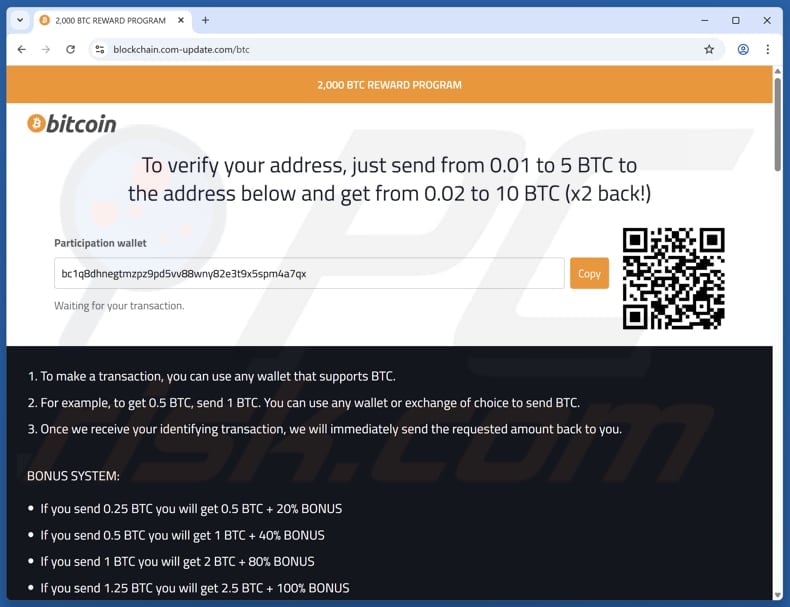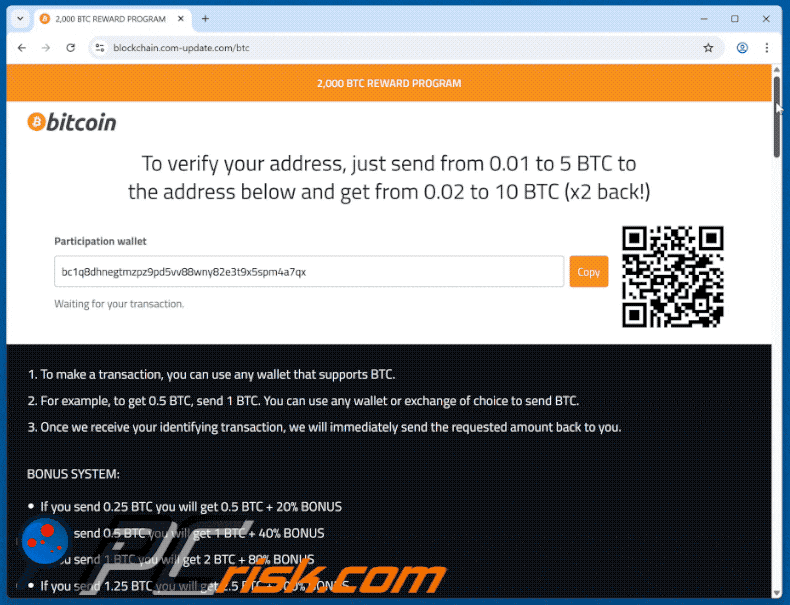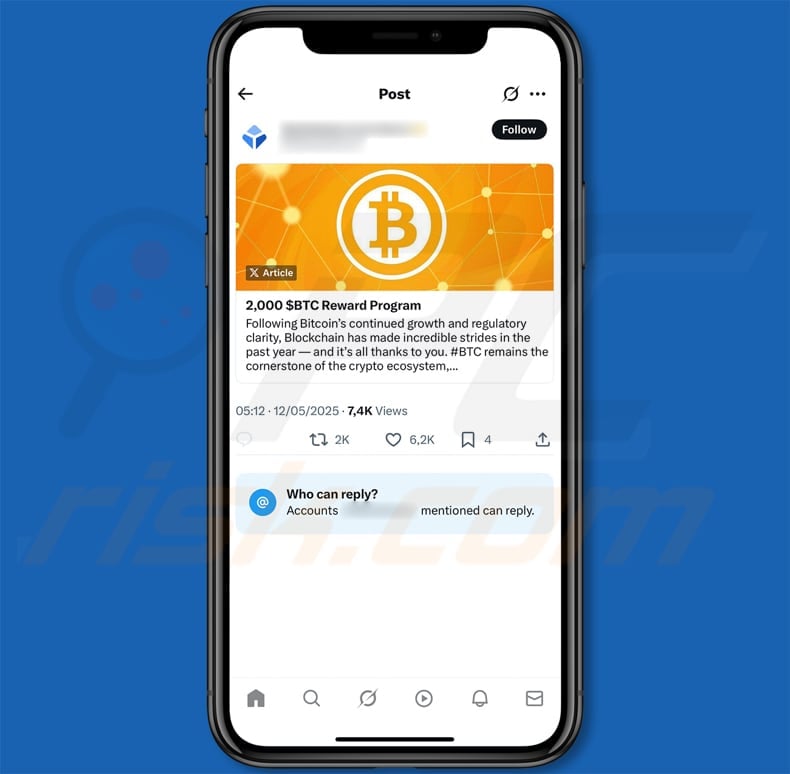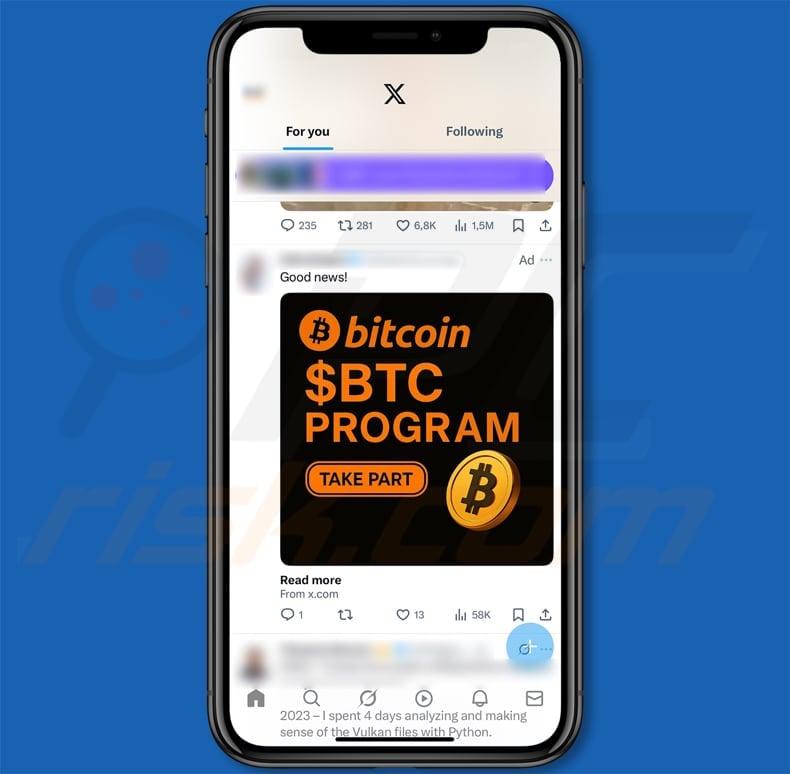How to spot scams like "Bitcoin Reward Program"
Phishing/ScamAlso Known As: Fake Bitcoin Reward Program website
Get free scan and check if your device is infected.
Remove it nowTo use full-featured product, you have to purchase a license for Combo Cleaner. Seven days free trial available. Combo Cleaner is owned and operated by RCS LT, the parent company of PCRisk.com.
What is the fake "Bitcoin Reward Program"?
Our analysis of the site has shown that it is a crypto scam. Scammers created it to deceive individuals into transferring them cryptocurrency. Victims of such scams usually lose their crypto permanently. It is important to examine crypto-related sites before taking action (e.g., connecting a wallet or transferring funds).

"Bitcoin Reward Program" scam in detail
The site promotes a fake Bitcoin reward program. It offers to double any Bitcoin sent to the provided wallet address. It instructs visitors to "verify their address" by transferring between 0.01 and 5 BTC and promises to return double the amount. The site states that the promised amount will be sent back immediately once a transaction is received.
This scam also includes a fake bonus system where higher transfers supposedly produce higher returns (e.g., sending 1 BTC will result in 2 BTC plus an 80% bonus). In reality, this is a cryptocurrency multiplication scam—once victims send their funds, they receive nothing in return.
In most cases, once cryptocurrency has been stolen, it cannot be retrieved. This is because blockchain transactions are decentralized and irreversible. Users should exercise caution when interacting with crypto-related websites that promise rewards or other benefits.
| Name | Fake Bitcoin Reward Program website |
| Threat Type | Phishing, Scam, Social Engineering, Fraud |
| Fake Claim | Participants can multiply their crypto holdings |
| Disguise | Legitimate Bitcoin doubling program |
| BTC Wallet | bc1q8dhnegtmzpz9pd5vv88wny82e3t9x5spm4a7qx |
| Related Domain | blockchain.com-update[.]com |
| Detection Names | ESET (Phishing), Fortinet (Phishing), Netcraft (Malicious), Seclookup (Malicious), Full List Of Detections (VirusTotal) |
| Symptoms | Unofficial domain, lack of official verification, unrealistic claims, too good-to-be-true promises. |
| Distribution methods | Fake social media accounts, deceptive websites, rogue online advertisements. |
| Damage | Loss of sensitive private information, monetary loss, identity theft, possible malware infections. |
| Malware Removal (Windows) |
To eliminate possible malware infections, scan your computer with legitimate antivirus software. Our security researchers recommend using Combo Cleaner. Download Combo CleanerTo use full-featured product, you have to purchase a license for Combo Cleaner. 7 days free trial available. Combo Cleaner is owned and operated by RCS LT, the parent company of PCRisk.com. |
Conclusion
This website is a classic cryptocurrency doubling scam. It lures users with promises of multiplied Bitcoin returns, but any funds sent are stolen and never returned. Due to the irreversible nature of crypto transactions, victims are unlikely to recover their losses, making it important to avoid such deceptive offers.
More examples of crypto-related scams are "Claim $ZORA Scam", "Claim Fomo Scam", and "Ethereum (ETH) Reward Program Scam".
How did I open a scam website?
The fake Bitcoin reward program is promoted using fake X (Twitter) accounts. Scammers craft deceptive posts with links to trick users into opening a fake BTC rewards website. Scam web pages can also be promoted using misleading online advertisements, pop-ups, notifications from shady pages, and similar channels.
Users can also be directed to scam pages via torrent sites, illegal movie streaming pages, and similar platforms that use rogue advertising networks. Deceptive emails containing links are also used to lure users. Overall, scammers use various ways to promote their scams.
How to avoid visiting scam pages?
Be cautious with unexpected or irrelevant emails (or messages on social media) from unfamiliar senders—avoid clicking links or downloading attachments/files they include. Do not allow suspicious web pages to show notifications, and do not interact with links, pop-ups, ads, etc., on such websites.
Download software from official websites or app stores and use a reliable security tool. Keep the operating system and apps up to date, and regularly scan a computer for potential threats. If your computer is already infected with unwanted apps, we recommend running a scan with Combo Cleaner Antivirus for Windows to automatically eliminate them.
The appearance of "Bitcoin Reward Program" scam website (GIF):

Screenshot of the deceptive post on X (formerly Twitter) promoting this scam:

Another X post promoting the scam:

Instant automatic malware removal:
Manual threat removal might be a lengthy and complicated process that requires advanced IT skills. Combo Cleaner is a professional automatic malware removal tool that is recommended to get rid of malware. Download it by clicking the button below:
DOWNLOAD Combo CleanerBy downloading any software listed on this website you agree to our Privacy Policy and Terms of Use. To use full-featured product, you have to purchase a license for Combo Cleaner. 7 days free trial available. Combo Cleaner is owned and operated by RCS LT, the parent company of PCRisk.com.
Quick menu:
- What is Fake Bitcoin Reward Program website?
- How to identify a pop-up scam?
- How do pop-up scams work?
- How to remove fake pop-ups?
- How to prevent fake pop-ups?
- What to do if you fell for a pop-up scam?
How to identify a pop-up scam?
Pop-up windows with various fake messages are a common type of lures cybercriminals use. They collect sensitive personal data, trick Internet users into calling fake tech support numbers, subscribe to useless online services, invest in shady cryptocurrency schemes, etc.
While in the majority of cases these pop-ups don't infect users' devices with malware, they can cause direct monetary loss or could result in identity theft.
Cybercriminals strive to create their rogue pop-up windows to look trustworthy, however, scams typically have the following characteristics:
- Spelling mistakes and non-professional images - Closely inspect the information displayed in a pop-up. Spelling mistakes and unprofessional images could be a sign of a scam.
- Sense of urgency - Countdown timer with a couple of minutes on it, asking you to enter your personal information or subscribe to some online service.
- Statements that you won something - If you haven't participated in a lottery, online competition, etc., and you see a pop-up window stating that you won.
- Computer or mobile device scan - A pop-up window that scans your device and informs of detected issues - is undoubtedly a scam; webpages cannot perform such actions.
- Exclusivity - Pop-up windows stating that only you are given secret access to a financial scheme that can quickly make you rich.
Example of a pop-up scam:

How do pop-up scams work?
Cybercriminals and deceptive marketers usually use various advertising networks, search engine poisoning techniques, and shady websites to generate traffic to their pop-ups. Users land on their online lures after clicking on fake download buttons, using a torrent website, or simply clicking on an Internet search engine result.
Based on users' location and device information, they are presented with a scam pop-up. Lures presented in such pop-ups range from get-rich-quick schemes to fake virus scans.
How to remove fake pop-ups?
In most cases, pop-up scams do not infect users' devices with malware. If you encountered a scam pop-up, simply closing it should be enough. In some cases scam, pop-ups may be hard to close; in such cases - close your Internet browser and restart it.
In extremely rare cases, you might need to reset your Internet browser. For this, use our instructions explaining how to reset Internet browser settings.
How to prevent fake pop-ups?
To prevent seeing pop-up scams, you should visit only reputable websites. Torrent, Crack, free online movie streaming, YouTube video download, and other websites of similar reputation commonly redirect Internet users to pop-up scams.
To minimize the risk of encountering pop-up scams, you should keep your Internet browsers up-to-date and use reputable anti-malware application. For this purpose, we recommend Combo Cleaner Antivirus for Windows.
What to do if you fell for a pop-up scam?
This depends on the type of scam that you fell for. Most commonly, pop-up scams try to trick users into sending money, giving away personal information, or giving access to one's device.
- If you sent money to scammers: You should contact your financial institution and explain that you were scammed. If informed promptly, there's a chance to get your money back.
- If you gave away your personal information: You should change your passwords and enable two-factor authentication in all online services that you use. Visit Federal Trade Commission to report identity theft and get personalized recovery steps.
- If you let scammers connect to your device: You should scan your computer with reputable anti-malware (we recommend Combo Cleaner Antivirus for Windows) - cyber criminals could have planted trojans, keyloggers, and other malware, don't use your computer until removing possible threats.
- Help other Internet users: report Internet scams to Federal Trade Commission.
Frequently Asked Questions (FAQ)
What is a crypto scam?
A cryptocurrency scam is a type of fraud in which scammers manipulate users into making decisions that benefit the scammers.
What is the purpose of a crypto scam?
In most cases, these scams are used to steal cryptocurrency from victims. The main difference is the technique used to achieve that.
Why do I encounter scam websites?
Scammers use fake social media profiles, deceptive emails, and compromised or fake websites to trick users into scam pages. Misleading advertisements, pop-ups on unreliable websites, notifications from dubious sites, and rogue ad networks commonly associated with torrent platforms and illegal streaming services are also used to promote scams.
Will Combo Cleaner protect me from scam sites?
Combo Cleaner analyzes websites for threats, detects malicious or misleading content, and prevents users from accessing such pages.
Share:

Tomas Meskauskas
Expert security researcher, professional malware analyst
I am passionate about computer security and technology. I have an experience of over 10 years working in various companies related to computer technical issue solving and Internet security. I have been working as an author and editor for pcrisk.com since 2010. Follow me on Twitter and LinkedIn to stay informed about the latest online security threats.
PCrisk security portal is brought by a company RCS LT.
Joined forces of security researchers help educate computer users about the latest online security threats. More information about the company RCS LT.
Our malware removal guides are free. However, if you want to support us you can send us a donation.
DonatePCrisk security portal is brought by a company RCS LT.
Joined forces of security researchers help educate computer users about the latest online security threats. More information about the company RCS LT.
Our malware removal guides are free. However, if you want to support us you can send us a donation.
Donate
▼ Show Discussion